Dvořák, French and Vasks
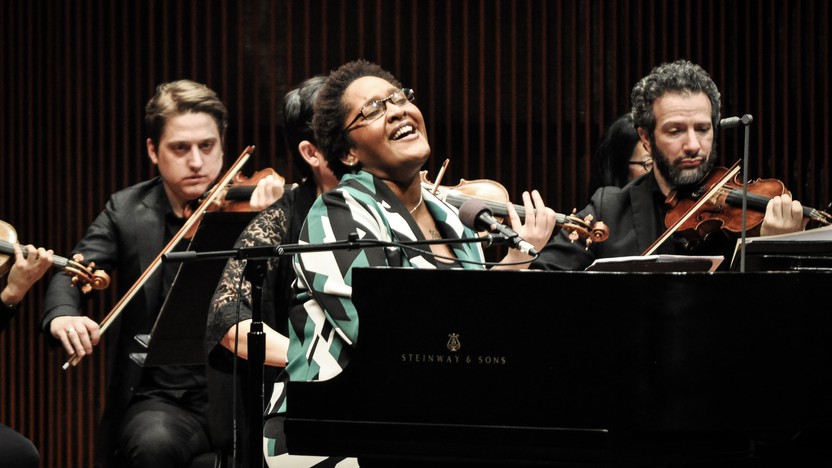

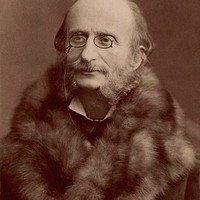
(Duration: 7 min)
Richard Wagner and Johannes Brahms may have been the most revered and influential composers of their time within elite circles, but if you had asked any average Joe in Europe who wrote the most popular music for the stage and concert hall, the two names on their tongue would have been Johann Strauss II and Jacques Offenbach. Born into a German family originating from the city that shares their surname, young Jacob Offenbach started going by Jacques when he resettled in Paris as a teenager. He left the Paris Conservatory after a year to play cello in the opera house that produced comedies, and in the decades to come he would specialize in those whimsical operettas that drew adoring crowds the way musicals do today.
Offenbach also kept up a recital career on the cello, and he bolstered his repertoire with the exquisitely tuneful Les larmes de Jacqueline (Jacqueline’s Tears) in 1853 as the second in a set of three “Woodland Harmonies.” Long a favorite of cellists, it reached new heights of popularity when the superstar cellist Jacqueline du Pré made it a signature piece.
Aaron Grad ©2023
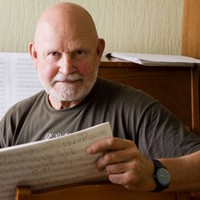 Listen to Audio
Listen to Audio
Pēteris Vasks began his musical career as a bass player, performing with ensembles in his native Latvia and neighboring Lithuania. He eventually went back to school for composition, and since the late 1970s he has produced a remarkable body of instrumental music while also training the next generations of Latvian composers at a conservatory in Riga. His international reputation received a huge boost after the violinist Gidon Kremer premiered Vasks’ concerto Distant Light and then recorded the work with his ensemble Kremerata Baltica for ECM Records in 1999. The composer provided the following program note.
I started composing the fantasy for violin and orchestra Vox amoris in fall 2008 and finished the score in early spring 2009. What is the message I wanted to announce? It is about the greatest power in the whole world — love. Love is, was, and will be as long as we will be. I believe that solo violin and string orchestra make the best combination for a “love story.”
The composition, in one single movement, starts with a muted string tremolo. Then the solo violin appears — searching, asking, until it blossoms in a broad melody which is supported by a gentle orchestral accompaniment. The solo violin Cadenza I links the introductory part with the central episode. The central part of the composition is built up from two sound waves. The first wave starts softly, slowly, and then the intensity increases, becomes stronger, and then decreases. The second wave is broader, more dramatic. The solo violin part becomes more challenging; the string orchestra plays an active role here. Cadenza II emphasizes the way to culmination — the highest point is reached when the solo violin and the orchestra meet — in a high register, in the highest intensity. A quiet pedal point is then the background for images from the beginning. The solo violin once again sings a cantilena of the glory of love. The piece ends in a melancholic yet light mood.
Vox amoris was created by initiative of the Australian Chamber Orchestra and its leader Richard Tognetti. I hope this work will reach the listeners and make the world a little brighter and more open to love.
© Pēteris Vasks
Aaron Grad ©2022
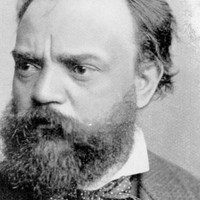
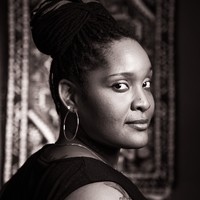
Commissioned for the SPCO by community supporters Bill and Susan Sands in collaboration with the American Composers Forum.
Born into a musical family in the historically Black neighborhood of Rondo in Saint Paul, PaviElle French has brought her lifelong influences from ‘70s soul and R&B into her wide-ranging and powerful work as a singer, songwriter, poet and theater artist. After she approached The Saint Paul Chamber Orchestra for a possible collaboration, she embarked on her first foray into concert music in 2018 with A Requiem for Zula, an orchestral song cycle that honored her late mother.
When SPCO supporters Bill and Susan Sands decided to commission a new work for the orchestra in honor of their fiftieth anniversary, they entrusted French with the assignment and encouraged her to respond to the commission in any way that was meaningful for her. French worked on the resulting score, The Sands of Time, in a world before the Covid pandemic, and before the murder of George Floyd, events that have only deepened her resolve to use her music in service of human connection and justice. As in her first piece for orchestra, French collaborated with the arranger Michi Wiancko, but after steeping herself in the principles of orchestration and the ranges of concert instruments, French took on the responsibility of distributing her music into the orchestral parts herself, using her keyboard to record layer upon layer in Apple’s GarageBand software.
Through meetings where she got to know Bill and Susan Sands, French was inspired to have her first movement deal most directly with romantic love. From the beginning of this song that shares its punning title with the cycle as a whole, “Sands of Time,” French speaks to us, the audience, as a knowing guide: “I’ve been thinking, y’all,” she sings, “about what love has taught me this far.”
The second song, “Give Me Your Love,” pivots to an interrogation of what disrupts love — a sentiment inspired specifically by the former president. “Your finite words of hurt and hatred won’t pollute my mind or change my hope for unification,” she sings. As an orchestral interlude takes flight, she invites us along, shouting, “Hold on y’all! Change is coming!”
In an interview, French spoke about how, in the years since the deaths of her parents, she has been on a journey “to love myself and to like myself, and to understand why I am the way I am, and be investigative and introspective, and to unlock core memories and fully love my whole, total being.” She articulates aspects of this brave emotional work in the third song, “Breaking Free,” where she sings, “It’s overwhelming to have to look so deep inside. I wanna break free from my iniquity.”
The next selections explore other facets of love that animate French’s life and music: “the love for my freedom of thought and freedom of speech, and the persistence of life. I was thinking about all the ways that love works, whether it is platonic or romantic or agape.” The sense of freedom comes through in the fifth song, “Me Being Me (Is Revolutionary).” A celebratory song, “The Dance of Life,” encourages us all to “be ambitious and assertive in the dance of life. There’s no room for any fear with an aura that’s so bright.” After an instrumental dance interlude, the cycle closes with a reprise of “Sands of Time,” bringing this journey of love back to its interpersonal point of origin.
French spoke about how much she learned from her mother, an educator and community activist, and her father, whom she described as “more hotheaded and political” and deeply involved in community action. As she sees it, “People can hear the truth if you can give it to them in a way that they can hear it. The way I approach music is that I am going to make it so beautiful and so lush and so honest and vulnerable and authentic that you have to hear it.”
Aaron Grad ©2022
Get driving directions and find nearby parking.
Find dining options close to the venue.
View seating charts to find out where you'll be seating.
SPCO concerts are made possible by audience contributions.
For exclusive discounts, behind-the-scenes info, and more:
Sign up for our email club!
